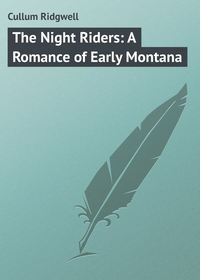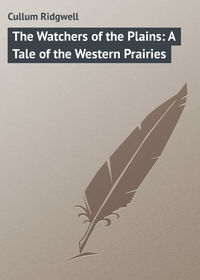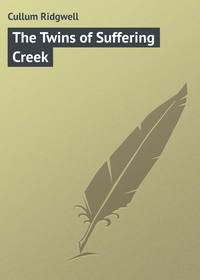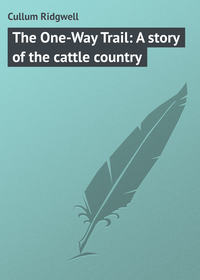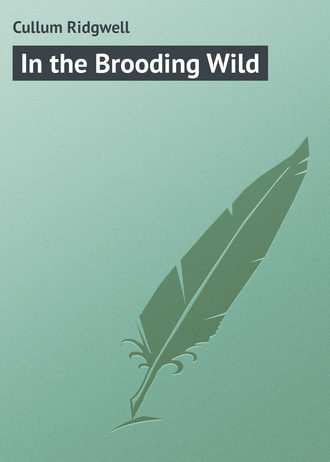 полная версия
полная версияIn the Brooding Wild
Then a moment later words, sounding hoarse and stifled, came from the depths of his storm-collar.
“Who–who is it?”
Nick did not answer. Both were staring out across the hollow at the tall motionless figure of a man, and their eyes were filled with an expression of painful awe. The figure was aggressively distinct, silhouetted as it was against a barren, snow-clad crag. They might have been gazing at a statue, so still the figure stood. It was enveloped in fur, so far as the watchers could tell, but what impressed them most was the strange hood which covered the head. The figure was too distant for them to have distinguished the features of the face had they been visible, but, as it was, they were lost within the folds of the grey hood.
There came an ominous click from behind. Ralph turned suddenly and seized his brother’s arm as he was in the act of raising his rifle to his shoulder. The gun was lowered, and the intense face of Nick scowled at the author of the interruption.
“It’s–it ain’t a human crittur,” he said hoarsely.
“It’s a man,” retorted Ralph, without releasing his hold.
And the two brothers became silent.
They stood watching for a long time. Neither spoke again, they had nothing to say. Their thoughts occupied them with strange apprehension while the dogs sprawled in the snow in the spiritless manner of their kind when the labour of the traces is not demanded of them. The figure on the hill stood quite still. The silence of the wild was profound. No wind stirred to relieve it, and even under their warm furs the two men watching shivered as with cold.
At last the movement they had awaited came. The Hooded Man turned towards them. One long arm was raised and he pointed away at a tall hill. Then his arm moved, and he seemed to be pointing out certain landmarks for his own benefit. Again, on a sudden, as he fronted the direction where the brothers stood, he dropped his arm, and, a moment later, disappeared on the other side of the hill. The two men remained gazing out across the hollow for some while longer, but as the Hooded Man did not return they turned back to their dogs and continued their journey.
Nick shook his head in a dissatisfied manner. Ralph said nothing for awhile. He was beginning to doubt his own assertion.
The dogs leapt at their breast-draws and the sled moved forward. The two men ran side by side. When Nick at length spoke it was to reiterate his fears.
“Ther’ wa’n’t no face showed,” he said abruptly.
“No,” replied Ralph. Then he added thoughtfully: “He hadn’t no dogs, neither.”
“He was alone, seemly. Ther’ wa’n’t no camp outfit.”
Ralph shook his head and brushed away the ice about his mouth with the back of his beaver mitt.
There was a painful atmosphere of disquiet about the two men. Their backward glances spoke far louder than words. Had their mission been in the nature of their ordinary calling they would possibly have felt nothing but curiosity, and their curiosity would have led them to investigate further, but as it was, all their inclinations tended in the opposite direction. “The Dread of the Wild” had come to them.
When they camped at midday things were no better. They had seen nothing more to disturb them, but the thoughts of both had turned upon the night, so long and drear, which was to come; and the “dread” grew stronger.
After the noon meal Nick harnessed the dogs while Ralph stowed the chattels. They were on a hillside overlooking a wide valley of unbroken forest. All was ready for a start and Nick gave a wide, comprehensive glance around. The magic word “Mush,” which would send the dogs headlong at their breast harness, hovered on his lips, but ere he gave it utterance it changed into an ejaculation of horror.
“By Gar!” Then after a thrilling pause, “The Hood!”
Ralph, standing ready to break the sled out, turned.
“Hey!” he ejaculated; and horror was in his tone, too.
There, in the hazy distance, more than three miles away, was the dim figure of the Hooded Man racing over the snow. His course lay on the far side of the valley and he was to the rear of them.
Nick turned back to the dogs, the command “Mush!” rang out with biting emphasis, and the dogs and men, as though both were animated by the same overwhelming fear, raced down the virgin trail. Their pace was a headlong flight.
Night came, and they camped in the open. The night was blacker, and longer, more weary and shadowy than the first, by reason of the “dread” which had now become the “Dread of the Hooded Man.” Even thoughts of the White Squaw took a secondary place in the minds of the brothers, for, at every turn, they felt that their steps were dogged by that other strange creature of the wild. When morning came they knew, without looking, that somewhere, coldly surveying their camp, the grey-hooded figure would be watching and waiting for them to move on. And sure enough, as the eager eyes looked out over the snow and forest, the grim, silent figure was there, watching, watching; but no nearer to them.
That night they came to the Moosefoot Reserve, and both men experienced such nervous relief as they had never before known. They camped within sight of the Indian teepees and log huts, but they waited for morning before they approached the chief.
Over their fire they discussed their plans with seriousness. Neither of them could speak the Moosefoot language, but they could talk both Sioux and Cree, and they did not doubt but there would be interpreters about the chief.
“We’ll see him first thing, I guess,” said the eager Nick. “Guess them two black foxes’ll fix him good. He’ll git a goodish bit o’ trade for ’em.”
“An’ we’ll promise him powder, an’ slugs, an’ essences,” said the cautious Ralph. “We’ll get his yarn first an’ pay after,” he added, as he sipped his coffee.
Nick nodded.
“We’ll fin’ that crittur, sure,” he said.
And he sat gazing upon the pictures his mind conjured up as he watched the flaming logs. In every tongue of flame he beheld the glowing face Victor had told them of, and, as the smoke rolled up into the black vault of night, he seemed to see the elusive form of the White Squaw floating in its midst. Ralph’s slower imagination was less fantastically, but no less deeply, stirred.
At daybreak they sought Man-of-the-Snow-Hill’s lodge. They found him a grizzled wreck of extreme age. He was surrounded by his medicine-men, his young chiefs and his squaws. And by the gathering in the smoke-begrimed hut they knew that their approach had been made known.
Perfect silence reigned as the white men entered. An Indian silence; such silence as it would be hard to find anywhere but in the primitive dwelling. The atmosphere of the place was heavy with the pungent odours of Killi-ka-nik. Both men and women were smoking it in pipes of red clay with reed stems, and they passed this sign of friendship from one to another in solemn fashion. All were clad in the parti-coloured blanket, and sat hunched upon their quarters more like beasts than human creatures, yet with that perfect air of dignity which the Indian seldom loses.
Man-of-the-Snow-Hill alone differed in his dress and attitude. He was wrapped in a large buffalo robe, and was stretched out upon a pile of skins to ease his rheumatics, while, spread out before him, were a number of charms and much “med’cine,” which had been so set by his wise men to alleviate his ailments. In the centre of the throng a fire smouldered, and the smoke therefrom rose sullenly upon the dense air and drifted out through a hole in the flat roof. Man-of-the-Snow-Hill blinked his watery eyes as the strangers entered, and passed his pipe to his favourite squaw, a buxom, sleepy-eyed beauty who sat upon his right. Then he grunted intelligently as he saw the visitors deposit their pile of presents upon the floor, and, in the manner of the neche, seat themselves beside it.
Ralph spoke his greeting in Indian fashion.
“How,” he said.
“How!” replied Man-of-the-Snow-Hill, in a thin, reedy voice. And his followers echoed the sentiment in chorus.
Then the aged chief held out his hand in further greeting. And each neche in turn shook the white men by the hand.
The visitors filled and lighted their pipes, and passed their plugs of tobacco to the others. Then Ralph began to speak in Cree.
“We come far to speak with Man-of-the-Snow-Hill,” he began.
The watery-eyed chief shook his head, grunting. The squaws laughed, and the med’cine-men closed their eyes in sign of not understanding the tongue in which he spoke. Then a young chief harangued his comrades. He could understand the tongue and would interpret. The old chief nodded approval and continued to gaze greedily at the presents.
Now the conversation proceeded quite smoothly.
“We wish to speak with the great Man-of-the-Snow-Hill in private,” Ralph said. “We have much to say, and many presents.”
The chief blinked with satisfaction, and grunted appreciation. His lined face lit up. He waved one shaking arm and his followers reluctantly departed. All except the interpreter and the chief squaw.
Then Ralph went on. Nick had care of the presents, and on him the cunning old chief kept his eyes. He opened a large bag of beads and emptied some on a spread of cheap print. The squaw’s eyes smiled greedily.
“We wish the great chief well,” said Ralph, using all the flowery embellishments of the Cree tongue, “and we would live in peace. We have tobacco, beads, skins, prints, and blankets. And we would lay them all at the feet of the great man, the mighty hunter, if he would help us to find that which we seek.”
Ralph signed to his brother and Nick laid out an array of presents and passed them with due solemnity to the old man.
“Ow-ow!” grunted Man-of-the-Snow-Hill, as he waved the things away to his squaw. He was not satisfied, and his eyes watered as though he were weeping.
Then Ralph went on.
“We have come on the ‘long trail’ through the mountains. And we seek the White Squaw of the Moosefoot Indians.”
The chief remained quite calm, but his bleared old eyes shot a sidelong gleam at the speaker in which there was little friendliness. No other movement was allowed to give evidence of disquiet. It is part of the upbringing of the neche to eschew all outward signs of emotion. The Sun Dance, when the braves are made, is the necessary education in this direction. Ralph saw the look but failed to take its meaning. The squaw watched the white men with keen interest. Nick was groping about in the depths of a gunny-sack.
Ralph plunged into the fantastic story which he and Nick had prepared. The language of the Cree helped him, for the natural colouring of the Indian tongues is as flowery as that of any Eastern race.
“We come from beyond the mountains, from the hunting-grounds of forest and river where the great fathers of the Moosefoot Indians dwelt. We come to tell the White Squaw that the land cries out for her, and the return of the children of the Moose. We come to speak with her of these things, for the time has come when she must leave her forest home and return to her own land. Man-of-the-Snow-Hill must show us the way. We have many presents which we will give him.”
“It is well,” said the great man, closing his eyes while the water oozed from between the compressed lids. “The white men are the friends of the Moosefoot people, and they have many presents. Have they fire-water?”
Nick produced some bottles and the great man reached for them greedily. But the other withheld them.
“What will Man-of-the-Snow-Hill do for the fire-water?” Ralph asked.
The interpreter passed the word.
“He will send his favourite squaw to guide the white men,” he answered at once. “He can do no more.”
A dozen bottles of vanilla essence passed over to the chief. A number of other presents were handed to him. Then without a word the squaw arose and accompanied the white men out.
And without further delay the brothers continued their journey. Fleet of foot, untiring, silent as only an Indian woman can be, the squaw led the way. North, north; always north they travelled, over hill, through forest and deep white valley, without let-up to their eager speed. The superstitious dread which had hitherto so afflicted the white men now fell away from them. Night came on swift and silent, and camp was pitched on the edge of a dense forest.
Ere the daylight had quite died out the squaw took the two men to the crest of a hill. She looked out across the virgin carpet of towering pines below them and pointed with one blanket-covered arm outstretched. She was silent while she indicated several points in the vast panorama before her. Then she tried to tell them something.
But her language was the language of her tribe, and neither of the men could understand her. Then she spoke in the language of signs, which all Indians speak so well.
She raised her hand, pointing eastward, till it reached a point directly overhead. Then she pointed to her feet, and her hand moved slowly in a northern direction, after which she made a running movement with her feet. Then she bent her body and appeared to be gazing about her, searching. Finally she pointed to two very large trees which stood out apart from their fellows. Then again came the motion of running, which finished quickly, and she pointed first to Nick’s face and then to herself. After that she stood motionless, with arms folded over her bosom. And the two men read her meaning.
At daylight they were to start out northward and travel until midday. Then they were to halt and search the outskirts of the forest until they found two mammoth trees standing apart. The space between them was the mouth of a pathway into the heart of the forest. They were to traverse this path a short distance, and they would discover the White Squaw.
Ralph nodded his head slowly in token of comprehension. He waited to see if she had aught further to say. But the woman remained standing where she was, slightly aloof and with her arms folded. Her sleepy eyes were watching the last dying gleam of daylight away in the west. Suddenly, out upon the still air, came a doleful cry. It was long-drawn-out and mournful, but it travelled as mountain cries will travel. It came waving upon the air with a certain rise and fall in it like the rippling of water. It rose up, up, and then lingeringly died out. The men listened, and looked in the direction whence it came, and, as they looked, a feeling of awe swept over them. In a rush the old “dread” awoke, and their gaze was filled with the expression of it.
Out to the west the forest lay gloomy, brooding; and within a few hundred yards of them stood the mighty sentry trees which the squaw had pointed out. But now between them, breaking up the dead white carpet which covered the earth, the tall form of the Hooded Man stood silhouetted. Grim and ghostly he looked, as, motionless, he gazed upon the watchers.
With the instinct of self-defence which the wild teaches so insistently, Nick unslung his rifle. Ere Ralph could stay him the shot rang out, echoing away over the tree-tops. The figure had disappeared, and the unblemished carpet of snow was as it had been before. Nick stood aghast, for he was a dead shot. Ralph gazed helplessly at the spot where the man had stood.
Suddenly Nick gasped.
“It–it ain’t human.”
And Ralph had no answer to make.
Then presently they turned to where the Moosefoot squaw had stood. She, too, had gone; vanished as completely as had the Hooded Man. There was the trail of her snow-shoes ruffling the snow, and the men ran following it as far as the forest edge; but here they stood. They could follow no further. Night was upon them. Slowly they returned to camp.
The next day they continued their journey with almost fanatical persistence. They found no sentry-trees such as the squaw had described. Forest, yes, but where in that region could they fail to find forest? The abode of the White Squaw was nowhere to be found.
That night they decided upon their next move in the quiet, terse manner of men who cannot bring themselves to speak of the strange feelings which possess them; who are ashamed of their own weakness, and yet must acknowledge it to themselves.
“An’ to-morrow–” said Nick, glancing apprehensively around beyond the fire, over which they were sitting, fighting the deadly cold of the night.
“To-morrow?” echoed Ralph.
“Where?” asked Nick, looking away towards the south.
Ralph followed the direction of his brother’s gaze.
“Um.” And he nodded.
“What–south?”
“South.”
“An’ the Wh–”
Ralph shook his head, and smoked on solemnly.
CHAPTER V.
THE WHITE SQUAW
Down the sharp incline Nick ran beside his dogs; Ralph was close behind. They were home once more in their own silent valley, and were pushing on to avoid the coming snow-storm which the leaden hue of the sky portended. So the dogs were rushed along at a great pace, for the dugout was beyond, a full hour distant.
It had been a weary journey, that return from the quest of the White Squaw. But the weariness had been mental. The excitement of their going had eaten up their spirit, and left them with a feeling of distressing lassitude. They were sobered; and, as men recovering from drunkenness, they felt ashamed, and their tempers were uncertain.
But as the string of huskies raced down into the valley they knew so well, yelping a joyful greeting to the familiar objects about them, the men began to feel better, and less like those who are detected in unworthy actions.
The dogs emerged upon their original outward-bound trail and pursued it along the edge of the forest. They needed no urging, and even set a pace which taxed all their masters’ speed. The sight of the familiar scenes had banished the “Dread of the Wild” from the minds of the two men, and their spirits rose as they approached the frost-bound river below their home. There were no stealing glances into the gloomy shelter of the woods, no nervous backward turns of the head. They looked steadily ahead for the glad sight of their home; and the snap of the crisp snow under the heavy-footed dogs, and the eager, steady pull on the traces brought a cheerful light to their eyes such as had not been there for days.
But although they had failed to discover the White Squaw, she was by no means forgotten. A certain sense of relief had followed their first moments of keen disappointment, but it was only a revulsion of their strained nerves; thoughts of her which were, perhaps, less fiery and reckless, but consequently more enduring, still possessed them.
Ralph was especially calm. He had thought the whole thing over in his deliberate fashion, and, finally, admitted to himself that what had happened was for the best. Nick was less easy. His disappointment had slightly soured an already hasty, but otherwise kindly, disposition. He needed something of his brother’s calm to balance him. But, however, in both cases, somewhere deep down in their hearts the fateful flame so strangely kindled was still burning; a deep, strong, unquenchable fire.
They were almost home. Before them lay the frozen waterway. Beyond that, and above, rose the hill, on the face of which stood their shack; and about them was the brooding silence, still and portentous, but familiar.
The lead-dog plunged down the bank and the rest followed, whilst Ralph and Nick steadied the laden sled. The brief passage was made, and Nick’s whip drove the fierce, willing beasts at the ascent beyond. Then, ere the sled had left the river, and while the dogs still struggled in their harness to lift its nose over what was almost a cut-bank, and when Nick’s attention was most needed, the whip suddenly became idle, and his stock of driving-curses changed to a shout of alarmed surprise.
Down he dropped upon his knees; and, with head bent low, examined the disturbed surface of the snow. In an instant Ralph was at his side. The dogs had ceased to pull and crouched down in their traces. A strange and wonderful thing had happened. In their absence their valley had been invaded, and the indications were those of human agency.
Nick pointed, and his outstretched forefinger moved slowly over a footprint indicating the sharp, clean outline which the surface of the snow still retained. A moccasin-covered foot had trodden there; and the mark left was small, smaller than that of an ordinary man. And the two heads, almost touching, bent over it in silent scrutiny.
Presently Ralph raised his eyes and looked ahead. Step by step he traced the marks on up the hill in the direction of the dugout, and, at last, silent speculation gave place to tense, low-spoken words.
“Injun moccasins,” he said.
“Guess so, by the seamin’.”
“’Tain’t a buck neche, neither.”
“No.”
There was an impressive pause, and the silent land seemed weighted down as with an atmosphere of gloomy presage. Nick broke it, and his voice had in it a harsh ring. The fire of passion was once more alight in his eyes.
“It’s a squaw’s,” he added.
“Yes, sure; a squaw’s,” and Ralph swallowed a deep breath as though his surroundings stifled him.
A thrill of emotion moved both men. There had leapt within them, in one great, overwhelming tide, all the old reckless craze for the shadowy creature of Victor’s story. At the mere suggestion of a squaw’s presence in that valley their blood-tide surged through their veins like a torrent of fire, and their pulses were set beating like sledge-hammers. A squaw! A squaw! That was their cry. Why not the White Squaw?
Whilst Ralph gazed on ahead Nick still bent over the footprint. The delicate shape, the deep hollow of the ball of the foot, the round cup which marked the heel, and, between them, the narrow, shallow indentation which formed the high-arched instep. In fancy he built over the marks the tall, lithe, straight-limbed creature Victor had told them of. He saw the long flowing hair which fell in a shower upon her shoulders; and the beautiful eyes blue as the summer sky. In a moment his tanned face was transformed and became radiant.
Ralph, the quiet and thoughtful, was no less moved. But he turned from his brother, hugging his own anticipations to himself, and concealing them behind a grim mask of impassivity. His eyes were bright with the same insistent idea, but he told himself that the thing was impossible. He told himself that She lived in the north, and not even the chase of the far-travelling moose could have brought her hither from her forest home. These things he said in his caution, but he did not listen to the voice of his doubt, and his heart beat in great bounding pulsations.
Suddenly Nick sprang from the ground, and short and sharp came his words.
“Let’s git on.”
“Ay,” replied Ralph, and he turned back to the sled.
And again the dogs laid foot to the ground; and again the voice of Nick roused the hollow echoes of the shimmering peaks; again the song of the sled-runners rose and fell in cadence brisk and sharp on the still, cold air. But all the world was changed to the men. The stillness was only the stillness which appeals to the physical senses. There was a sensation of life in the air; a feeling of living surroundings; a certain knowledge that they were no longer alone in their valley. A woman was present; the woman.
The widening break of the forest gave place to a broad sloping expanse of snow-land. It was the hill down which they had travelled many thousands of times. Above, more snow-laden forest, and above that the steel of the glacier which rose till its awful limits plunged into the grey world of cloud. The dugout was not yet in view; there was a scored and riven crag, black and barren, impervious to the soft caresses of velvety snow, to be passed ere the home which was theirs would be sighted. Besides, as yet neither of the men had turned their eyes from the trailing footprints to look ahead. Thus they came to the higher ground.
Now the barren crag seemed to thrust itself out, an impassable barrier; a mute protest at further progress; a grim, silent warning that the home beyond was no longer for them, no longer the home they had always known. And the hard-breathing dogs toiled on, straining at their breast-harness, with bodies heaving forward, heads bent low, and quarters drooped to give them surer purchase. They, too, as though by instinct, followed the footprints. As the marks swung out to pass the jutting cliff the lead-dog followed their course; Nick, on the right of them, moved wide, and craned to obtain a first view of the hut. Suddenly he gave a great shout. The dogs dropped in their harness and crouched, snarling and snapping, their jaws clipping together with the sound of castanets, whilst their wiry manes rose upon their shoulders bristling with ferocity which had in it something of fear. Ralph reached his brother’s side and peered beyond the cliff.




